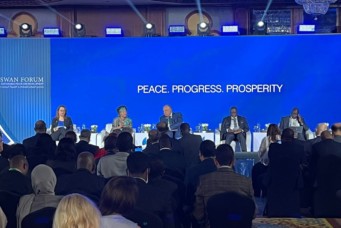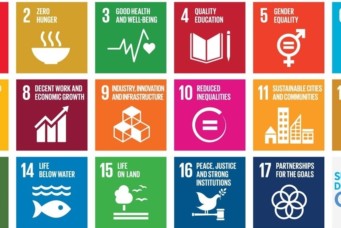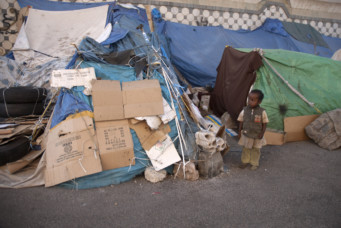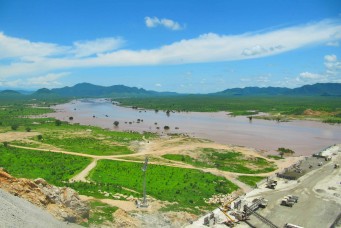Working Towards Sustainable Peace and Development Through Cooperation: An Interview with Ahmed Abdel-Latif
The Cairo International Center for Conflict Resolution, Peacekeeping and Peacebuilding is a unique Egyptian organization with a mandate for peace through capacity building, convening and research. Director-General Ahmed Abdel-Latif leads the center through its many activities, including serving as the Aswan Forum’s Secretariat.
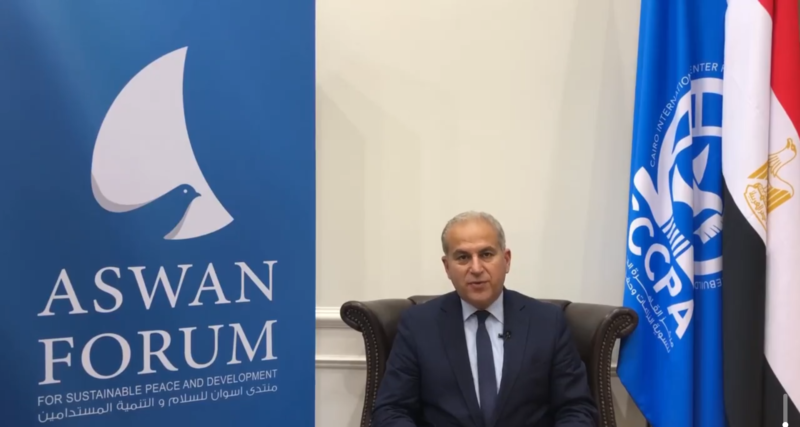
Ambassador Ahmed Abdel-Latif. CCCPA/Facebook
As the third edition of the Aswan Forum concluded on June 22, the Cairo Review’s deputy senior editor, Omar Auf, sat with Ambassador Ahmed Abdel-Latif, Director-General of the Cairo International Center for Conflict Resolution, Peacekeeping and Peacebuilding (CCCPA). Key issues discussed in this year’s edition included climate change, peacebuilding, financing, youth and women empowerment, and their linkages to peace and development.
Highlights of the Third Edition
To Abdel-Latif, this year’s Aswan Forum had four important highlights. The first highlight was connected to the forum’s theme, which was “Africa in an era of cascading risks and climate vulnerability: pathways for a peaceful, resilient, and sustainable continent”. The idea of cascading risks is epitomized in the concurrence of heightened geopolitical tensions, global economic downturn, looming global food crisis, increased climate change impacts and continued health and socio-economic reverberations of the COVID-19 pandemic. These are all features of the a new global landscape, adding to already-existing pressures of peace and security challenges in Africa, including armed conflict and terrorism.
Climate change was another important theme in the forum, particularly its effects on peace and development. In particular, due to climate change becoming a “threat multiplier,” it has contributed to “exacerbating tensions, fueling conflict dynamics by impacting economic resources, food security, water security, leading to displacement on a big scale”. Moreover, “a lot of work done for climate adaptation can have positive effects for peace and peacebuilding.” Yet because of its context-specific nature, emphasis must be placed on nationally owned measures, according to Abdel-Latif. This allows local policymakers to formulate unique solutions to unique challenges that each country inevitably faces.
To address this challenge and others which face the continent, the forum emphasized integrating youth into the discussion, through a dedicated youth dialogue held for the first time during the Forum which brought together African youth who work on climate issues with those working on peacebuilding, inviting a “cross fertilization” of both areas to advance innovative solutions that can help achieve a more peaceful and climate resilient continent.
The final highlight of the Aswan Forum was “Aswan in practice,” where the Forum Conclusions are implemented on the ground, and then the lessons learned fed back into the Forum’s deliberations. This came through a field mission carried out by a CCCPA team to Nigeria in December 2021. The mission sought to provide insights into the Nigerian context and the ongoing efforts to confront the threat of terrorism, specifically in light of the recent waves of mass defections from Boko Haram instigated after the death of Boko Haram’s Leader Abu Bakr Shekau. State and federal level initiatives have been responding to this threat, specifically within Borno state, which is the epicenter of Boko Haram’s insurgency. During the mission, the team met with state and federal officials and put together a report that “provides a number of insights on how to ensure the synergies between both the state and federal approaches, and how to maximize the benefits of these two approaches and ensure that they work in tandem.” The report was subsequently presented at the Forum, in the presence of the Governor of Borno.
On the Aswan Forum: Changes and Constants
When asked about how to operationalize the outcomes of the Aswan Forum, Abdel-Latif pointed to the Aswan Forum Conclusions, which are issued after the forum, capturing its key messages. “They’re often quite general, but they try to capture where the gaps are, where is the action needed to advance sustainable peace and development.” He added that CCCPA, as the forum’s secretariat, tries to be a “catalyst” in putting the Conclusions to practical use, such as through the field mission in Nigeria and working closely with the forum’s partners.
Abdel-Latif also gave the example of discussions on the Red Sea, which have been a constant theme throughout the forum’s three editions. The Red Sea region links Africa to Asia and the Middle East, and is an important trade route going through the Suez Canal, but also continues to grapple with a range of security challenges and cascading risks, such as armed conflict, protracted violence, terrorism, forced displacement and food crises, as well pre-existing fragilities exacerbated by the pandemic and climate change. . By the third edition, however, Abdel-Latif noted that there is broad understanding regarding the challenges facing the area, and posed the question “how can we concretely contribute to addressing them The response envisaged was holding a capacity-building course on conflict resolution in the Red Sea last November, which brought together diplomats and foreign defense officials from Arab and African countries of the Red Sea “to see how we can strengthen their capacities regarding confidence building, cooperation and conflict resolution in the Red Sea”.
The Aswan Forum is a platform on peacebuilding at the end of the day. Here Abdel-Latif mentions “the operationalization of the humanitarian-development-peace nexus, which is basically the idea that these three dimensions should be implemented in harmony in a coherent manner,” as a constant that seeks to strengthen the interlinkages between peace, security, and development. He added that “everybody agrees that there’s a clear relationship between these elements; you cannot have peace without development, and vice versa.” Although most stakeholders agree with this statement, when it is put into practice, programs, financing, and projects supporting these areas “tend to still operate in silos”.
The matter of financing was another important issue raised in the conference, with its own dedicated session. From overall funds directed to peace operations, peacebuilding only received a low share, which numbered just 3 percent according to one panelist. The low share of financing towards climate adaptation compared to climate mitigation was also criticized. There were repeated calls from developed countries to honor their pledges, as well as a suggestion to rethink the distribution of special drawing rights, for a more equitable distribution of funds. The role of the private sector was seen as key in areas such as climate mitigation, though other panelists warned of the limitations of the private sector.
An important core principle underpinning the Aswan Forum discussions, which is important to preserve, is the notion of homegrown African responses and national ownership to solutions, to ensure maximum agency and respect the context-specific nature of problems and solutions. This was emphasized in the third edition by William Azumah Kanyirege-Awinador, the African Union’s Senior Advisor on Governance and Peacebuilding in the Department of Political Affairs, in the session on AU-UN partnerships. Abdel-Latif believes that it is “fundamental that the African countries own the responses to the challenges they face”.
CCCPA: Activities, Mandate,and More
On the subject of the center and its activities, Abdel-Latif explained that CCCPA is an Egyptian institution established in 1994 by the Egyptian Ministry of Foreign Affairs with a regional and international role, as it is an African Union center of excellence.
On the African level, the center is one of the focal points for training the North African capability of the African Standby Force, while on the Arab level CCCPA is “the only civilian training center on peacekeeping and peacebuilding in the region that delivers its work in Arabic.” Furthermore, according to Abdel-Latif, CCCPA is “very much embedded in the peacekeeping community,” as it trains, in cooperation with the Ministry of Defense, Egyptian peacekeepers to be deployed to UN peacekeeping missions.
Peacebuilding, on the other hand, was explicitly added to the center’s mandate in 2017, which “reflects the importance peacebuilding has acquired in international efforts—that keeping peace is not enough, you need to also build peace, and to sustain the full cycle from conflict prevention, peacekeeping to peacebuilding.”
When asked how exactly do you build peace, Abdel-Latif explained that peacebuilding is a broad term referring to “all the elements needed to have a peaceful environment” including, in particular, addressing the root causes of conflict. The Director-General described peacekeeping as “very punctual” when it comes to implementing a ceasefire or respecting a peace agreement, “but peacebuilding aims to complement that by tackling the root causes of conflict, the associated grievances, building the institutions needed to have lasting peace, as well as the economic conditions, and infrastructure, and empowering women and youth.” Abdel-Latif added that disarmament, demobilization, and reintegration (DDR), is also an area which the center works very closely with, in addition to Preventing Radicalization and Extremism Leading Terrorism (PRELT), Women, Peace and Security, Combating Human Trafficking and Smuggling of Migrants, and Climate Security and Development.
Abdel-Latif concluded by emphasizing the importance of building institutions and ensuring that a long-term vision for stabilization is put in place: “To have effective peacebuilding, you need strong institutions, and institutions that are capable of delivering, and addressing all these complex challenges and risks. So really all these efforts come under peacebuilding.” He went on to identify the main challenge facing peacebuilding is the lack of sufficient finance, stating that “we need to increase the financing for peacebuilding to support creating the environment for lasting peace in fragile and conflict affected settings.”
Omar Auf is deputy senior editor at the Cairo Review of Global Affairs. He has previously worked and published in independent media organization Mada Masr and as an assistant editor at the Cairo Review.
Auf holds a Master of Global Affairs degree with a regional and international security concentration from the American University in Cairo, and a Bachelor of Arts in economics from Sciences Po Paris.
Read More
